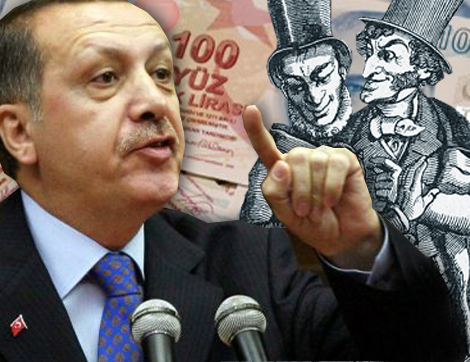
• Same tactics used to cause collapse of Asian economies in 1990s now being employed against anti-NWO nations.
By Bill White —
Zionist bankers and Rothschild-owned media outlets like The Wall Street Journal have launched a coordinated attack on the currencies of nations refusing to join their New World Order (NWO), according to Turkish Prime Minister Recep Tayyip Erdogan and other leaders of victimized countries, including Russia, Venezuela and Argentina.
Erdogan’s central banker, Erdem Basci, raised interest rates in Turkey to 10% in a nominal effort to stop the Turkish lira from losing value against the dollar. Erdogan, who opposes all interest and says the rate should be 0%, called the move “un-Islamic.”
Turkey’s central bank was one of several to take extreme measures to defend its currency as a network of bankers and Zionist agents began selling the Turkish lira, the Venezuelan bolivar, the Argentine peso and the Russian ruble as cheaply as possible, sucking U.S. dollars out of those economies. The fire sale of hoarded currencies resembles the move that destroyed East Asian economies and made Hungarian Jew Schwartz György, better known as George Soros, rich 20 years ago.
“Our economy has been unsettled by an economic war of gross speculation, by hoarding, along with psychological war from abroad,” Venezuelan President Nicolas Maduro said in a TV address.
The currency attacks showed the vulnerability of nations who seek to preserve their sovereignty in the face of the NWO. Internationalists have targeted Maduro for his nationalization of Venezuelan companies, and his defeat of “Holocaust survivor” descendent Henri Capriles-Radonski in the presidential elections.
Argentina’s Christina Kirchner has refused to be bullied into paying illegitimate debt claims by international bankers.
Erdogan has challenged the Zionists in Palestine and questions the policies of Turkey’s Rothschild-owned central bank.
Russian President Vladimir Putin has limited Jewish power and refused to impose homosexuality on the Russian people.
As a result, those nations that contract for outside goods on a dollar basis have been hit particularly hard. In a global economy where nations do not mine their own resources or manufacture goods domestically, a collapse in the exchange rate causes prices of imported goods to rise. Because the national currencies are not backed by commodities like gold, and are only supported by foreign exchange, national banks quickly become helpless in the face of such attacks.
Nations like Russia, which is more self-sufficient and less import-dependent than Latin America, felt relatively little effect from the run on dollars, freezing some dollar-denominated bank accounts but taking no drastic measures and letting the ruble float. Because Russia manufactures so many of its own goods and mines so much of its own resources, only foreign luxury goods increased in price. In fact, a weak ruble may help Russia increase its share of world exports, and Russia already maintains bilateral trade agreements with several nations, including China.
But even nations like Argentina, which has been a net exporter, have felt repercussions. As a net exporter, Argentina brings in more dollars in trade than it sends out, and so its dollar reserves should be increasing. Argentina has been making moves to protect its people from such an attack by limiting domestic use of the dollar. But Argentina has failed to take itself off the dollar internationally by, say, allying with the BRICS (Brazil, Russia, India, China and South Africa) nations, and lacks the domestic mining and manufacturing base to independently supply its citizens.
Ultimately, the manufactured financial crisis highlights the need for nations to adopt nationalist economic policies and a ban on the Bretton Woods system, which imposed the dollar as the world reserve currency after World War II.
Bill White is a freelance journalist and publisher based in Virginia. He has also written articles for THE BARNES REVIEW (TBR) magazine.


